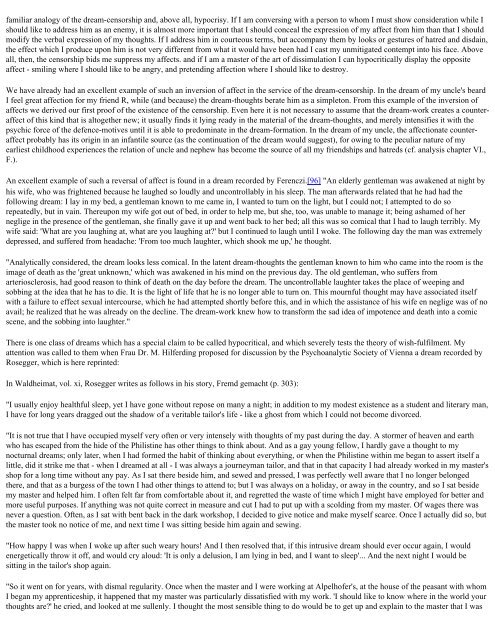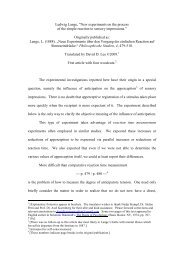The Interpretation Of Dreams Sigmund Freud (1900) PREFACE
The Interpretation Of Dreams Sigmund Freud (1900) PREFACE
The Interpretation Of Dreams Sigmund Freud (1900) PREFACE
Create successful ePaper yourself
Turn your PDF publications into a flip-book with our unique Google optimized e-Paper software.
familiar analogy of the dream-censorship and, above all, hypocrisy. If I am conversing with a person to whom I must show consideration while I<br />
should like to address him as an enemy, it is almost more important that I should conceal the expression of my affect from him than that I should<br />
modify the verbal expression of my thoughts. If I address him in courteous terms, but accompany them by looks or gestures of hatred and disdain,<br />
the effect which I produce upon him is not very different from what it would have been had I cast my unmitigated contempt into his face. Above<br />
all, then, the censorship bids me suppress my affects. and if I am a master of the art of dissimulation I can hypocritically display the opposite<br />
affect - smiling where I should like to be angry, and pretending affection where I should like to destroy.<br />
We have already had an excellent example of such an inversion of affect in the service of the dream-censorship. In the dream of my uncle's beard<br />
I feel great affection for my friend R, while (and because) the dream-thoughts berate him as a simpleton. From this example of the inversion of<br />
affects we derived our first proof of the existence of the censorship. Even here it is not necessary to assume that the dream-work creates a counteraffect<br />
of this kind that is altogether new; it usually finds it lying ready in the material of the dream-thoughts, and merely intensifies it with the<br />
psychic force of the defence-motives until it is able to predominate in the dream-formation. In the dream of my uncle, the affectionate counteraffect<br />
probably has its origin in an infantile source (as the continuation of the dream would suggest), for owing to the peculiar nature of my<br />
earliest childhood experiences the relation of uncle and nephew has become the source of all my friendships and hatreds (cf. analysis chapter VI.,<br />
F.).<br />
An excellent example of such a reversal of affect is found in a dream recorded by Ferenczi.[96] "An elderly gentleman was awakened at night by<br />
his wife, who was frightened because he laughed so loudly and uncontrollably in his sleep. <strong>The</strong> man afterwards related that he had had the<br />
following dream: I lay in my bed, a gentleman known to me came in, I wanted to turn on the light, but I could not; I attempted to do so<br />
repeatedly, but in vain. <strong>The</strong>reupon my wife got out of bed, in order to help me, but she, too, was unable to manage it; being ashamed of her<br />
neglige in the presence of the gentleman, she finally gave it up and went back to her bed; all this was so comical that I had to laugh terribly. My<br />
wife said: 'What are you laughing at, what are you laughing at?' but I continued to laugh until I woke. <strong>The</strong> following day the man was extremely<br />
depressed, and suffered from headache: 'From too much laughter, which shook me up,' he thought.<br />
"Analytically considered, the dream looks less comical. In the latent dream-thoughts the gentleman known to him who came into the room is the<br />
image of death as the 'great unknown,' which was awakened in his mind on the previous day. <strong>The</strong> old gentleman, who suffers from<br />
arteriosclerosis, had good reason to think of death on the day before the dream. <strong>The</strong> uncontrollable laughter takes the place of weeping and<br />
sobbing at the idea that he has to die. It is the light of life that he is no longer able to turn on. This mournful thought may have associated itself<br />
with a failure to effect sexual intercourse, which he had attempted shortly before this, and in which the assistance of his wife en neglige was of no<br />
avail; he realized that he was already on the decline. <strong>The</strong> dream-work knew how to transform the sad idea of impotence and death into a comic<br />
scene, and the sobbing into laughter."<br />
<strong>The</strong>re is one class of dreams which has a special claim to be called hypocritical, and which severely tests the theory of wish-fulfilment. My<br />
attention was called to them when Frau Dr. M. Hilferding proposed for discussion by the Psychoanalytic Society of Vienna a dream recorded by<br />
Rosegger, which is here reprinted:<br />
In Waldheimat, vol. xi, Rosegger writes as follows in his story, Fremd gemacht (p. 303):<br />
"I usually enjoy healthful sleep, yet I have gone without repose on many a night; in addition to my modest existence as a student and literary man,<br />
I have for long years dragged out the shadow of a veritable tailor's life - like a ghost from which I could not become divorced.<br />
"It is not true that I have occupied myself very often or very intensely with thoughts of my past during the day. A stormer of heaven and earth<br />
who has escaped from the hide of the Philistine has other things to think about. And as a gay young fellow, I hardly gave a thought to my<br />
nocturnal dreams; only later, when I had formed the habit of thinking about everything, or when the Philistine within me began to assert itself a<br />
little, did it strike me that - when I dreamed at all - I was always a journeyman tailor, and that in that capacity I had already worked in my master's<br />
shop for a long time without any pay. As I sat there beside him, and sewed and pressed, I was perfectly well aware that I no longer belonged<br />
there, and that as a burgess of the town I had other things to attend to; but I was always on a holiday, or away in the country, and so I sat beside<br />
my master and helped him. I often felt far from comfortable about it, and regretted the waste of time which I might have employed for better and<br />
more useful purposes. If anything was not quite correct in measure and cut I had to put up with a scolding from my master. <strong>Of</strong> wages there was<br />
never a question. <strong>Of</strong>ten, as I sat with bent back in the dark workshop, I decided to give notice and make myself scarce. Once I actually did so, but<br />
the master took no notice of me, and next time I was sitting beside him again and sewing.<br />
"How happy I was when I woke up after such weary hours! And I then resolved that, if this intrusive dream should ever occur again, I would<br />
energetically throw it off, and would cry aloud: 'It is only a delusion, I am lying in bed, and I want to sleep'... And the next night I would be<br />
sitting in the tailor's shop again.<br />
"So it went on for years, with dismal regularity. Once when the master and I were working at Alpelhofer's, at the house of the peasant with whom<br />
I began my apprenticeship, it happened that my master was particularly dissatisfied with my work. 'I should like to know where in the world your<br />
thoughts are?' he cried, and looked at me sullenly. I thought the most sensible thing to do would be to get up and explain to the master that I was



